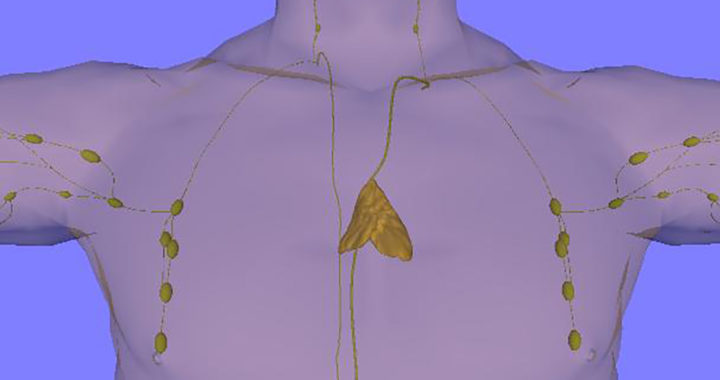The thymus is a primary lymphoid organ located behind the sternum, between the upper portions of the lungs, and in front of the heart. As part of the immune system, it is primarily responsible for the maturation and differentiation of a specific type of white blood cells or leukocytes called thymus leukocytes or T cells.
Role of the Thymus in the Immune System and the Body
Remember that the primary purpose of the thymus is to facilitate the maturation of T cells. These cells originate as hematopoietic precursors from the bone marrow before migrating to the organ to develop and differentiate into different types of T cells.
An Organ For Facilitating T Cell Development
T cells collectively represent one of the five major types of leukocytes. They are primarily responsible for the cell-mediated component of the adaptive immune system. Some T cells attack and destroy virus-infected cells and tumor cells. In contrast, others aid in the activation of other immune cells through the release of cytokines, and some regulate the entire immune response.
Upon the arrival of progenitor cells from the bone marrow to the thymus, these premature T cells are initially called thymocytes. The thymus produces and releases several hormone-like proteins to stimulate T cell maturation and differentiation.
The organ produces and secretes three types of hormone-like proteins to aid in T cell development. Take note of the following:
• Thymosin: Stimulates the development of T cells, promotes the immune response, and stimulates certain pituitary gland hormones.
• Thymopoietin and Thymulin: Assist in differentiating T cells into different types such as helper T cells, cytotoxic T cells, memory T cells, and regulatory T cells, among others.
• Thymic Humoral Factors: Functions similarly to thymosin, thymopoietin, and thymulin, and influence the reactivity of the lymphatic system.
Positive Selection and Negative Selection of T Cells
The thymus is essentially a critical organ of the immune system. However, it is also part of the lymphatic system because it belongs to the entire network of organs and tissues that connects the immune system and the circulatory system. Once T cells developed in this organ, they migrate and reside to the lymph nodes located throughout the body.
Because it serves as the site for T cell differentiation, it specifically enforces positive selection. Epithelial cells in the thymus present maturing T cells with specific peptides to check if their receptors are capable of reacting. A failed or weak reaction means that these T cells are incapable of mounting an immune response. These rejected cells will die by apoptosis.
The organ also protects against autoimmunity. The epithelial cells in the thymus also express major proteins found elsewhere in the body. If the T cells attack these proteins, they would be eliminated through a process called negative selection.
General and Clinical Significance of the Thymus
Remember that the thymus functions as an organ for stimulating the development of T cells, as well as for their positive and negative selections. It is fundamentally an integral part of the immune system and the lymphatic system.
Note that this organ is active at a young age. It continues to grow at birth, and it reaches its maximum size by puberty. However, its size and activity decrease after puberty in a process called thymic involution. Individuals essentially produce fewer T cells as they traverse through their adult lives. Loss of thymic function contributes to a weaker immune system in old age, especially susceptibility to infections, cancer, and autoimmunity.
Several diseases have been associated with abnormalities in this organ. Defects in its tissues can result in different types of autoimmune diseases such as autoimmune polyendocrine syndrome, thymoma-associated multiorgan autoimmunity, and myasthenia gravis. These diseases demonstrate abnormal T cell development.
Congenital problems with the development of this organ could also lead to immunodeficiency. An abnormal thymus at an early age could result in a severely weakened immune system, thus rendering an individual susceptible to infections. Photo credit: LearnAnatomy/Adapted/CC BY 3.0
FURTHER READINGS AND REFERENCES
- Lee, D. K., Hakim, F. T., and, Gress, R. E. 2010. “The Thymus and the Immune System: Layered Levels of Control.” Journal of Thoracic Oncology. 5(1): S273-S276. DOI: 1097/JTO.0b013e3181f20474
- Pearse, G. 2006. “Normal Structure, Function, and Histology of the Thymus.” Toxicology Pathology. 34(5): 504-514. DOI: 1080/01926230600865549





